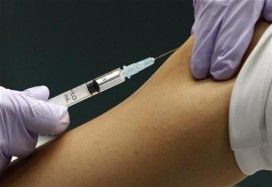Universal Flu Vaccine: Influeza Discovery May Render Annual Flu Shots Obsolete [REPORT]

Annual flu shots could become a thing of the past after an encouraging discovery may give way to a universal flu vaccine.
Researchers with the Scripps Research Institute and the Crucell Vaccine Institute said they found a human antibody that protects against influenza A and B strains -- knowledge that may one day be used to create a universal flu vaccine, according to ABC News.
The discovery, published Thursday in the journal Science, was uncovered when the researchers injected human volunteers with a vaccine. They then used antibodies generated from the volunteers into mice and found the antibodies protecting mice from A and B strains of influenza.
Using the information discovered by the researchers, a treatment for flu sufferers may be close at hand, with a universal flu vaccine possibly following suit.
"To develop a truly universal flu vaccine or therapy, one needs to be able to provide protection against influenza A and influenza B viruses," said Ian A. Wilson, Hansen professor of structural biology at Scripps Research and the new study's senior investigator, according to ABC News. "With this report, we now have broadly neutralizing antibodies against both."
Using the discovery, a universal flu vaccine may not be far off in the future, which would render annual flu shots obsolete.
"The Holy Grail of influenza research is to find a mechanism to protect people against essentially all the numerous different strains of influenza viruses," Dr. William Schaffner, professor and chair of preventive medicine at Vanderbilt University, told ABC News. "This research is a heartening step forward."
Another encouraging implication of the discovery is that it can be applied to treat those who are already suffering from the flu.
"If this is true, it is big news in that it allows us to protect those too young or old to benefit from flu vaccines, and those immunocompromised from a large variety of illnesses that don't allow them to respond to vaccines," Dr. Gregory A. Poland, a professor of medicine, infectious diseases, molecular pharmacology and experimental therapeutics at the Mayo Clinic and Foundation, told ABC News.
© Copyright IBTimes 2025. All rights reserved.






















